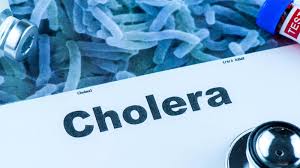ONCE again, Nigeria finds itself gripped by a cholera outbreak that has claimed dozens of lives and sickened over a thousand others across various states. Cholera, a waterborne disease caused by ingesting the Vibrio cholerae bacteria, thrives in environments with poor hygiene and contaminated water sources. This entirely preventable public health emergency exposes systemic failures in providing safe water, sanitation, and hygiene to the citizens. The Nigeria Centre for Disease Control and Prevention (NCDCP) has warned of an increasing trend of cholera cases as the rainy season intensifies. The statistics paint an unwholesome picture. From January 1 to June 11, 2024, over 1,141 suspected and more than 65 confirmed cases of cholera have been reported, resulting in over 30 deaths from 96 Local Government Areas (LGAs) in 30 states. The states bearing the brunt of this outbreak – Bayelsa, Zamfara, Abia, Cross River, Bauchi, Katsina, Imo, Nasarawa, and Lagos – account for 90 percent of the cholera burden.
Delta State, with its coastal communities, is not immune to the threats posed by cholera. Although the State Commissioner for Health, Dr. Joseph Onojaeme, has confirmed that there is currently no cholera outbreak in the state and that the case recorded in Warri South West Local Government Area has been resolved, the risk remains significant as the rainy season progresses.
We commend the state government for its swift action in addressing the sole case, but efforts must continue to ensure Delta State remains cholera-free. Addressing the challenges of cholera outbreaks requires a multifaceted approach that goes beyond immediate response to encompass long-term preventive measures. The first step is the provision of high-standard water and sanitation facilities. Access to clean water and proper sanitation is a fundamental human right. The state government should prioritize the construction and maintenance of water treatment plants and ensure the distribution of clean water to these coastal communities. In areas where pipe-borne water is not feasible, alternative solutions such as boreholes and water purification systems should be implemented. Likewise, a strict drive to discourage open defecation to avoid the contamination of water sources.
Strengthening the healthcare system is another vital component in the fight against cholera. Health facilities in the State must be further equipped with the necessary resources to respond swiftly to outbreaks. This includes ensuring that hospitals and clinics have adequate supplies of oral rehydration solutions, antibiotics, and intravenous fluids, which are critical in treating cholera patients. Healthcare workers should receive regular training on cholera management and prevention, enabling them to provide effective care and educate the community on preventive measures.
In addition to improving infrastructure and healthcare, state-led educational campaigns on cholera prevention are essential. Public education can empower citizens with the knowledge they need to protect themselves and their families from cholera. Campaigns should focus on promoting handwashing with soap, safe food preparation practices, and the importance of drinking clean water. Schools, religious institutions, and community centers can serve as platforms for disseminating this information, ensuring it reaches a broad audience.
While the immediate focus is on preventing cholera outbreaks, it is also essential to establish robust surveillance systems to detect and respond to cases promptly. The government should invest in strengthening the surveillance infrastructure, including training health workers in disease reporting and establishing rapid response teams. Early detection and swift response can prevent isolated cases from escalating into full-blown outbreaks.
The State Government must also consider the environmental factors that contribute to the spread of cholera. Poor waste management, flooding, and inadequate drainage systems can all exacerbate the risk of cholera. The government should implement measures to improve waste disposal, manage flood risks, and maintain proper drainage systems. Environmental sanitation campaigns can engage community members in cleaning their surroundings and preventing the accumulation of waste that can contaminate water sources.
The fight against cholera is not just a public health issue; it is a moral imperative that demands the collective efforts of the government, communities, and individuals. By taking these proactive measures, Delta State can protect its citizens and ensure a healthier and MORE prosperous future for all.


